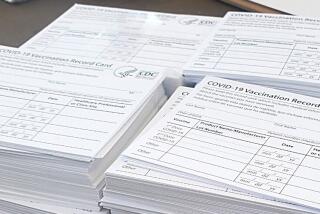Suspected AIDS Victim Held in Selling of Blood
- Share via
A West Hollywood man believed to have AIDS has been arrested on suspicion of attempted murder for selling his blood to a Los Angeles donation center, authorities said Saturday.
The arrest of Joseph Edward Markowski, 28, described by police as a prostitute, is thought to be the first time since the outbreak of AIDS that a person has been arrested on suspicion of intentionally donating contaminated blood. Markowski donated plasma, which is the liquid portion of the blood, authorities said. Plasma is collected by a process that returns the blood cells to the donor.
More than two-dozen criminal and civil cases have been filed throughout the country accusing people of trying to transmit the AIDS virus by sexual acts, biting or spitting, according to public health experts and lawyers who follow AIDS litigation. However, none of those cases has involved endangering the blood supply.
Los Angeles County Dist. Atty. Ira Reiner said Saturday that it is still unknown whether any of Markowski’s allegedly contaminated plasma has reached medical centers or has been intercepted by the screening process in use since 1985 to weed out blood containing the AIDS virus.
Reiner said he will announce Monday whether to file an attempted murder charge against Markowski, who is being held in the sheriff’s downtown Hall of Justice jail in lieu of bail.
Reiner and Los Angeles police gave only sketchy details about the circumstances of Markowski’s arrest. The following picture emerged:
Markowski, who had been arrested on suspicion of public drunkenness in late May and then had been arrested and charged with petty theft in early June, was taken into custody again for psychiatric observation last Wednesday after he dialed 911 to report a non-existent violent crime. When police arrived at the reported address they found only Markowski.
While in the Police Department’s Mental Evaluation Unit, Markowski told officers he had AIDS, a police spokesman said.
He was subsequently released, but was arrested again on Thursday. Officers had found a receipt from a blood donation center when they examined his personal possessions.
Donor Is Paid
Authorities would not release the name of that center. However, it was believed to be a Central Los Angeles proprietary center, where the donor is paid, as opposed to the Red Cross or a hospital blood center.
Reiner declined to answer questions about whether his investigators have independently determined whether Markowski has AIDS, the acquired immune deficiency syndrome that leaves the body vulnerable to rare infections, cancers or neurological disorders. The district attorney said only that Markowski had given investigators access to his medical records and permission to test his blood.
From several sources, Reiner said, “we have very substantial information that he has AIDS, that he knew he had it, that he knew if he sold his blood his blood would be contaminated, and that it would contaminate those who received it--and all that notwithstanding, he sold his plasma.”
Conflicting Information
Reiner said the decision on whether to file an attempted murder charge is troublesome because “there is no law directly addressing this question” and also because investigators have received conflicting information about the number of donations Markowski made, as well as the number of locations he may have sold blood.
Experts familiar with the procedures used to screen blood and plasma for the AIDS virus said the chance that virus-infected blood would escape detection is extremely remote. (The same test is used for plasma as for whole blood.)
“It should have been picked up,” said Dr. Carl P. Treling, a pathologist at Hollywood Presbyterian Medical Center, which operates a blood bank.
A federal advisory panel last year estimated that the danger of contracting AIDS from a blood transfusion is “substantially less” than 1 in 10,000.
‘Window Period’
Treling and other experts noted that there is a “window period” between the time an individual is infected with the virus and the body’s immune system recognizes it and begins to produce antibodies to fight the infection. Since the AIDS blood test relies on the detection of the antibodies, the virus might be missed during this time. Treling said this period lasts “a few months.”
Hospitals and blood banks seek to avoid this scenario by telling those in high-risk groups not to give blood. But according to government scientists and representatives of the blood bank industry, some high-risk individuals are continuing to donate blood.
A federal study conducted last year showed that 88% of blood donors whose blood had tested positively for exposure to the AIDS virus were members of high-risk groups.
Earlier this month, the state Senate approved a bill that would make it a crime, punishable by up to six years in prison, for people to donate blood if they know they have AIDS or have tested positive for exposure to the virus. The bill is now in the Assembly.
Contributing to this story was Times staff writer Alan C. Miller.
More to Read
Sign up for Essential California
The most important California stories and recommendations in your inbox every morning.
You may occasionally receive promotional content from the Los Angeles Times.












